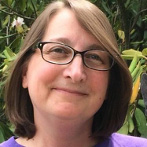Carol Wolf
 Carol is a graphic designer with over 35 years of experience creating and building brands for global clients in a wide range of industries. Currently an independent consultant, she has worked for leading branding firms including Landor Associates, Interbrand and FutureBrand NY. Her client list consists of numerous Fortune 500 corporations and others, including IBM, Bank of America, DuPont, Underwriters Laboratories, Johnson & Johnson, GM, AT&T, the Palm Islands in Dubai, and the PGA European Tour.
Carol is a graphic designer with over 35 years of experience creating and building brands for global clients in a wide range of industries. Currently an independent consultant, she has worked for leading branding firms including Landor Associates, Interbrand and FutureBrand NY. Her client list consists of numerous Fortune 500 corporations and others, including IBM, Bank of America, DuPont, Underwriters Laboratories, Johnson & Johnson, GM, AT&T, the Palm Islands in Dubai, and the PGA European Tour.
She plays a leadership role in communications and promotion of social justice issues at the Unitarian Society of Ridgewood. Carol also manages The Cottage Place Gallery in Ridgewood, NJ.
Carol received her BFA at the School of Art of The Cooper Union in 1984, and was a recipient of the A.A. Low Fund Prize for Excellence in Art. As a Council Member, Carol served for five years as Chair/Co-chair of the CUAA Annual Fund committee, for three years as Co-chair of the Augustus Saint-Gaudens Award committee, and was an active member of numerous other committees. In 2017, Carol was honored as CUAA Alumna of the Year. Carol was also a key supporter of the Committee to Save Cooper Union. Carol and her husband Bill Wolf A’84 are currently building a collection of historical Cooper-related memorabilia and ephemera.
Role: Alumni Trustee
Elected to the Board: 2020
Class Term: 2024
Term Limit: 2024




